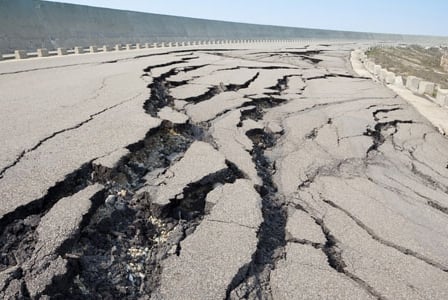
A new study from the United States Geological Survey admits that there is truth to the reports that fracking is linked to earthquakes.
For several months we’ve been hearing reports that hydraulic fracturing (a method of oil extraction also known as “fracking”) may be linked to an increased risk of earthquakes. Now, a new study from the United States Geological Survey (USGS) and published by the Seismological Society of America admits that there is truth to these rumours.
Fracking involves blasting sand, water, and fracking fluid (made from proprietary—and therefore unknown to the public—recipes of chemicals) deep underground to break up the rock and uncover oil. The increase in earthquakes is believed to be due to the disposal of the wastewater produced during the fracking process. Wastewater is often disposed of by injecting it deep into the earth.
Since fracking has become popular in the US, there has been a steep increase in the number of earthquakes. According to the study’s abstract, in reference to Oklahoma (where fracking is occurring), it is unprecedented to have a rate of change this significant that is caused by natural forces “outside of volcanic settings or in the absence of a main shock, of which there were neither in this region.”
The study concludes that “the seismicity rate changes described here are almost certainly manmade” but there is much more research to be done to determine details.
According to the USGS website, it appears that the more wastewater is produced and disposed of, the greater the chance of an earthquake. Wastewater, even after being disposed of, is not static, and can migrate away from the injection site, inducing earthquakes farther away.
However, there is no way to predict earthquakes as of yet, and not all wastewater disposals induce earthquakes. The USGS maintains that more research needs to be done.
Although this recent research is US-based, fracking is causing concerns in Canada as well. Just hearing about hydraulic fracturing for the first time? Check out our recent article.



